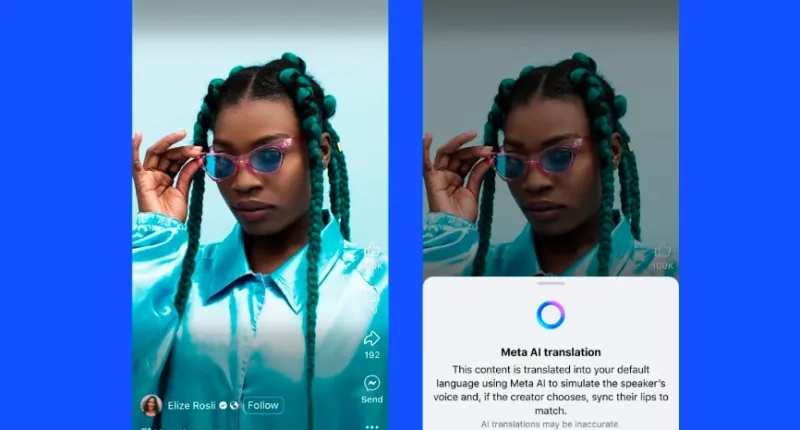Meta has launched a new AI-powered translation feature for creators on Facebook and Instagram, starting with English and Spanish. The tool allows creators to automatically translate and dub their Reels, making it easier for them to reach audiences who speak different languages. The translation system uses advanced AI to preserve the original tone and emotion of the creator’s voice while converting it into the target language.
Under this latest update, an optional lip-sync feature can adjust the audio to match the creator’s mouth movements, creating a more natural and engaging experience for viewers. Creators can enable this feature by selecting ‘Translate your voice with Meta AI’ before publishing a Reel, and they can review the translated version to decide whether to include lip-syncing before sharing it.
The feature is available to Facebook creators with at least 1,000 followers, as well as all public Instagram accounts globally where Meta AI is offered. Reels that are translated using this tool are tagged to indicate they were created with Meta AI, and they are shown to users based on their preferred language settings. Creators also gain access to new Insights metrics that show how their content performs across different languages.
Initially, the translation feature supports translating content between English and Spanish. But the Mark Zuckerberg-led company plans to extend support to more languages in the future.
The social media company now also allows creators with a Facebook Page to upload their own translated audio tracks to Reels. Pages can add up to 20 dubbed audio tracks per Reel. Like Meta AI translations, viewers will hear the Reel in the language they have selected in their settings. To use this feature, creators can go to the Reels composer in Meta Business Suite, enable ‘Upload your own translated audio tracks’ under the ‘Closed captions & translations’ section, and upload their audio files while selecting the corresponding language. Translated tracks can be added, replaced, or removed both before and after publishing the Reel.
The latest move comes as the company intensifies its efforts in the AI domain, particularly in voice technology. Recently, it acquired WaveForms AI, known for its advanced audio capabilities, and PlayAI, a startup specializing in voice AI. However, despite advancements in voice technology, the company’s efforts are not free from controversies. For example, its AI chatbots (some using celebrity voices like John Cena and Kristen Bell) were found engaging in inappropriate and sexually explicit conversations with users, including minors. Earlier, the company’s Voicebox AI, a speech synthesis model capable of generating realistic speech from short audio samples, raised concerns about potential misuse.
The Tech Portal is published by Blue Box Media Private Limited. Our investors have no influence over our reporting. Read our full Ownership and Funding Disclosure →






